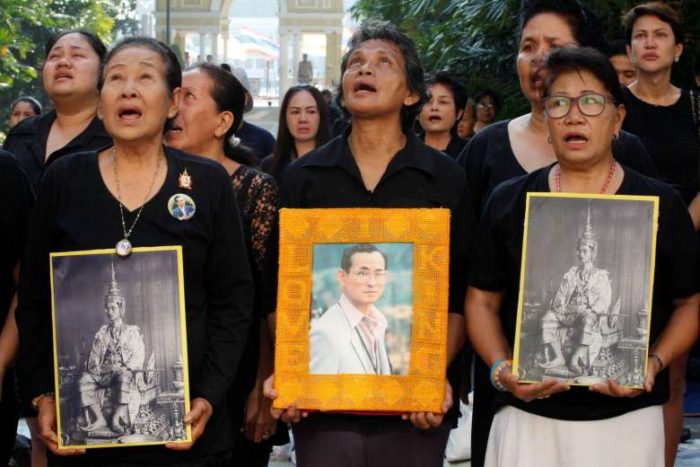Published in the Nikkei Asian Review 17/10/2016
Thailand is in deep mourning after the passing of the much-revered King Bhumibol, who reigned for seventy years. During that period the country experienced umpteen coups d’état and attempted coups. Democracy has proved no panacea for deep-seated social and regional divisions, in fact may have exacerbated them. Even so, Thailand has continued to develop economically and become a huge magnet for tourism and foreign direct investment from Japan and other countries.
Thai politics has never been pretty, but neither has it generated enough instability to present a deadly threat to the country’s growth. The monarchy must take a great deal of credit for contributing to the building of a national identity, which is essential for limiting social and ethnic conflicts. Many other countries, including some in South East Asia, have not been so lucky.
Most Thais seemed to have unbounded affection for their King, to judge by the outpouring of grief and portraits on display everywhere. The question now is how much of that feeling is down to the late King himself and how much attaches to the institution. For the vast majority of the public there has been no difference between the two for their entire lives.
Crown Prince Maha Vajiralongkorn, King Bhumibol’s heir apparent since 1972, has a tough act to follow. Working in his favour is the fact that modern monarchy has proved to be a surprisingly durable institution.
In nearly all the countries that have monarchies there is little desire to change the status quo – and that includes wealthy social democratic countries in Europe, such as Sweden, Denmark, Norway, Luxembourg, Belgium and Holland.
In Japan, opinion polls have reflected overwhelming support for the Emperor since they were first taken in the 1950s. Abolishing the institution is favoured by a tiny and diminishing percentage of the population. When Emperor Akihito intimated in August that he wanted to abdicate for reasons of ill-health, there was a wave of sympathy for him in the country at large.
Many of the countries of the British commonwealth have opted to retain the British monarch as head of state. In Canada, 70% of the public supports keeping the monarchy; it is one of the features that distinguishes their country from the superpower to the south. Australia has a strong republican tradition – current Prime Minister Malcolm Turnbull is a committed anti-royalist – yet when the issue was tested by referendum in 1999 the result was a decisive vote against change.
Spain – even more politically-riven than Thailand after the civil war and subsequent long rule of General Franco – restored the monarchy in 1978. Despite recent scandals, it is widely accepted
NO REGRETS FOR CANADIANS
So why has monarchy been so successful in such a variety of different settings? At first sight a system that works by hereditary succession seems woefully out-of-synch with the values of meritocracy and fairness that the modern world is supposed to prize. In fact, though, it is those outmoded characteristics that are the key to its longevity. Because the values of the marketplace, efficiency and the struggle for survival have become so ubiquitous, the spaces that remain untouched become more valuable.
One such space is the family; we don’t lay off our children or siblings in favour of lower cost alternatives. Heredity wins over merit. Another is the monarchy; kings and queens do not need better exam grades or CVs to get their positions. They symbolize an older and deeper form of social relation.
They also symbolize continuity. It is remarkable that Japan has had only four Emperors since the Meiji Restoration of 1868, a period in which the United States and France have had 27 and 25 heads of state respectively. The world has been transformed out of all recognition since the mid nineteenth century. There have been dizzying technological, social and political changes; industrialization, world wars, the spread of mass communications. Monarchy is an institution in the shape of a person that binds societies to their histories. Without such institutions we might drown in the flood of change.
The strongest argument for constitutional monarchy is that it is better than the alternatives. As the reputation of politicians falls, the relative attraction of a non-political head of state grows. It is doubtful that many Canadians envy Americans their choice of either Donald Trump or Hillary Clinton as head of state and symbol of the nation. Most European monarchs enjoy public support ratings of 70-80%, a level that elected political leaders can only dream about.
Monarchies, with their time-honoured ceremonies and special garb, provide what 19th century British journalist Walter Bagehot called “magic and mystique.” The idea that economic progress removes the need for such enchantment is wrong. It simply finds other vehicles – such as vacuous celebrities or, worse, malign political figures. A recent Financial Times article described how the cult of Mao Zedong has re-emerged in today’s China as a semi-religious phenomenon. Much better, surely, is the spectacle provided by the wedding of Prince William and Kate Middleton in 2011, watched on TV by over half the British population and a global audience of 350 million.
The trick that modern monarchs must perform is to embody tradition and continuity while adapting to new conditions. As marriage breakups and extra-marital liaisons have become more common in British society, so they have within the British royal family, with three of Queen Elizabeth’s four children having divorced. Nobody expects them to be spotless. On the other hand, clutching onto outdated privileges or transgressing contemporary social norms could be fatal. The last French royal house, the Bourbons, famously “learned nothing and forgot nothing” and they are long gone.
Modern monarchy’s golden rules are keep a safe distance from political strife, don’t go too far off-piste in terms of personal behaviour and always remember that public support is essential to the institution’s survival.
The King is dead. Long live the King.
